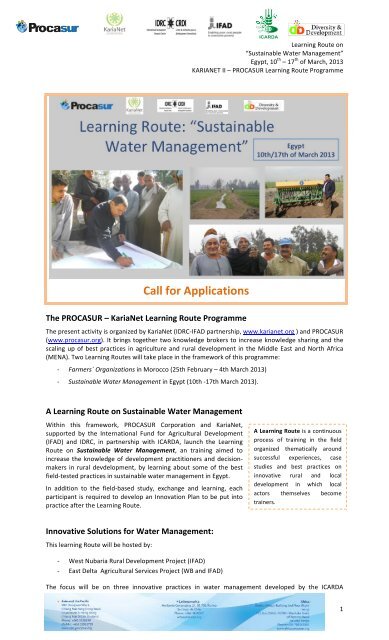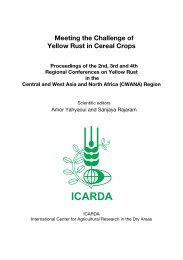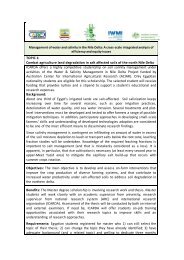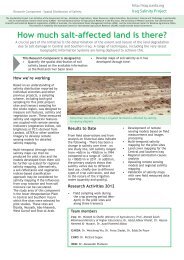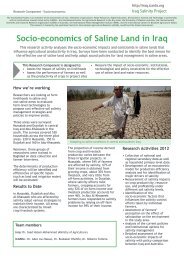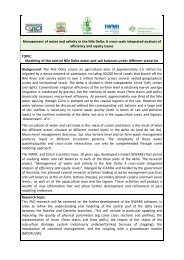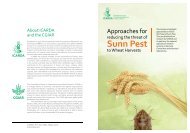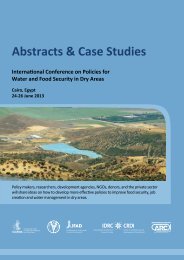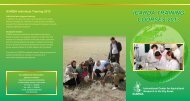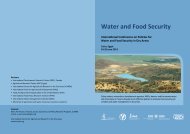Call for Applications - ICARDA
Call for Applications - ICARDA
Call for Applications - ICARDA
Create successful ePaper yourself
Turn your PDF publications into a flip-book with our unique Google optimized e-Paper software.
Learning Route on <br />
“Sustainable Water Management” <br />
Egypt, 10 th – 17 th of March, 2013 <br />
KARIANET II – PROCASUR Learning Route Programme <br />
<strong>Call</strong> <strong>for</strong> <strong>Applications</strong> <br />
The PROCASUR – KariaNet Learning Route Programme <br />
The present activity is organized by KariaNet (IDRC-‐IFAD partnership, www.karianet.org ) and PROCASUR <br />
(www.procasur.org). It brings together two knowledge brokers to increase knowledge sharing and the <br />
scaling up of best practices in agriculture and rural development in the Middle East and North Africa <br />
(MENA). Two Learning Routes will take place in the framework of this programme: <br />
-‐<br />
-‐<br />
Farmers´ Organizations in Morocco (25th February – 4th March 2013) <br />
Sustainable Water Management in Egypt (10th -‐17th March 2013). <br />
A Learning Route on Sustainable Water Management <br />
Within this framework, PROCASUR Corporation and KariaNet, <br />
supported by the International Fund <strong>for</strong> Agricultural Development <br />
(IFAD) and IDRC, in partnership with <strong>ICARDA</strong>, launch the Learning <br />
Route on Sustainable Water Management, an training aimed to <br />
increase the knowledge of development practitioners and decision-makers<br />
in rural devdelopment, by learning about some of the best <br />
field-‐tested practices in sustainable water management in Egypt. <br />
In addition to the field-‐based study, exchange and learning, each <br />
participant is required to develop an Innovation Plan to be put into <br />
practice after the Learning Route. <br />
A Learning Route is a continuous <br />
process of training in the field <br />
organized thematically around <br />
successful experiences, case <br />
studies and best practices on <br />
innovative rural and local <br />
development in which local <br />
actors themselves become <br />
trainers. <br />
Innovative Solutions <strong>for</strong> Water Management: <br />
This learning Route will be hosted by: <br />
-‐<br />
-‐<br />
West Nubaria Rural Development Project (IFAD) <br />
East Delta Agricultural Services Project (WB and IFAD) <br />
The focus will be on three innovative practices in water management developed by the <strong>ICARDA</strong> <br />
1
Learning Route on <br />
“Sustainable Water Management” <br />
Egypt, 10 th – 17 th of March, 2013 <br />
KARIANET II – PROCASUR Learning Route Programme <br />
Benchmark project, which has adapted irrigation techniques to specific soil and water characteristics of <br />
three agro-‐ecological areas commonly found in MENA region and in the irrigated Nile delta (New Land, <br />
Old Land, marginal Land). <br />
The three technological packages developed by <strong>ICARDA</strong> in the three agro-‐ecological areas are: <br />
-‐<br />
-‐<br />
-‐<br />
Deficit irrigation in new lands of West Nubaria <br />
Water saving through mechanized raised bed in old lands of Sharkia <br />
Water-‐Soil management in marginal areas of Port Said <br />
The different <strong>ICARDA</strong> benchmark packages are aimed at improving water saving and maximize irrigation <br />
water productivity in sustainable irrigated agricultural cropping system. The project addresses socio-economic<br />
activities to enhance adoption and management by the farmers and has established solid <br />
linkages with other projects to scale-‐up the adoption of the technological packages at a wider level. The <br />
technological packages have a high potential to be scaled out in other countries of the MENA region <br />
characterized by similar agro-‐ecological areas. <br />
The Learning Route´s objectives: <br />
This Learning Route´s main objective is to improve understanding, application and on-‐farm adoption of <br />
innovative irrigation packages to improve water management and water saving in different agro-ecological<br />
areas in Egypt. <br />
The specific objectives are: <br />
1. Identify key elements of different irrigation packages and adapted to specific soil and water <br />
characteristics of different agro-‐ecological areas in Egypt. <br />
2. Understand the adoption and scaling –up at on-‐farm level of irrigation packages, and their <br />
socio-‐economic impacts on the livelihood of the small-‐farmers; <br />
3. Understand social aspect of water management in the three different agro-‐ecological zones, <br />
including roles and responsibilities of Water Management (WM) at all levels; <br />
Hosting cases <br />
The Learning Route will be hosted by the following case studies: <br />
Experience Description Main lessons and innovations <br />
1. West Nubaria Rural <br />
Development Project <br />
(WNRDP -‐ IFAD) and <br />
<strong>ICARDA</strong> Benchmark <br />
research project, in <br />
New Lands of West <br />
Nubaria, Egypt <br />
New lands have been created in West Nubaria in <br />
the early nineteen eighties, when the Egyptian <br />
state accomplished roads and irrigation <br />
infrastructures in the desert. By law, more than <br />
9000 graduates and renters from the Delta region <br />
resettled in West Nubaria, where they received a <br />
house and 2.5 hectares of irrigated, but poor and <br />
sandy land. Many of them managed to overcome <br />
starting up problems, by adapting agricultural <br />
techniques. The farmers in the newly created <br />
communities come from different regions in the <br />
Delta and community management of irrigation <br />
infrastructures (pumps and irrigation canals) is <br />
challenging. <br />
The West Nubaria Rural Development Project <br />
(WNRDP), started in 2003 with funds from IDS, <br />
IFAD and the Egyptian government, is providing <br />
support to farmers of the area by improving the <br />
irrigation systems and by facilitating the adoption <br />
and the scaling up of new technologies and <br />
innovations in water irrigation, amongst which the <br />
deficit irrigation package, developed by <strong>ICARDA</strong>. <br />
Water saving techniques in farming are <br />
crucial in desert areas. The deficit <br />
irrigation package developed by <strong>ICARDA</strong> <br />
has enormous potential to save water <br />
without loss of production and to solve <br />
water shortage problems in the community <br />
based irrigation systems. <br />
The case shows the importance of <br />
individual perseverance and success <br />
stories to scale-‐up innovations and <br />
adoption of water saving techniques to <br />
other farmers inhabiting the project area <br />
and replicable in similar environments in <br />
the region. <br />
2
Learning Route on <br />
“Sustainable Water Management” <br />
Egypt, 10 th – 17 th of March, 2013 <br />
KARIANET II – PROCASUR Learning Route Programme <br />
2. East Delta Agricultural <br />
Services Project <br />
(EDASP -‐ IFAD and WB) <br />
and <strong>ICARDA</strong> <br />
Benchmark research <br />
project, in Marginal <br />
Lands of Port Said, <br />
Egypt. <br />
3. <strong>ICARDA</strong> Benchmark <br />
research project in Old <br />
Lands of Sharkia <br />
In the northern Delta soils, salinity is higher than <br />
normal, especially in lands that used to be flooded <br />
frequently or incidentally by the sea. Evaporation <br />
can increase the problem. Crops cultivated in this <br />
area that have proven to be tolerant or semi-‐ <br />
tolerant to salinity are rice, maize and cotton in <br />
summer and wheat, barley and clover in winter. <br />
Also sugar beet is an appropriate crop <strong>for</strong> the <br />
northern Delta. The solution <strong>for</strong> reducing salinity is <br />
leaching. This is a slow process, and the many light <br />
clay soils of the region have salt concentrations <br />
ranging from 4 to 64 dS/m (>3 is already <br />
considered high <strong>for</strong> most crops). <br />
The EDASP project, started in 2000, aims at <br />
providing services <strong>for</strong> 29,000 families of newly <br />
settled graduates on 130,000 acres reclaimed in <br />
East Delta Region, and also to increase their <br />
agricultural production. The project offers many <br />
services to the farmers of the area, amongst which <br />
it is promoting and scaling up the adoption of the <br />
Soil amendment package developed and <br />
promoted by the <strong>ICARDA</strong> benchmark project, <br />
which is a combination of raised-‐bed farming with <br />
extra fertilization/compost subsidized. <br />
The old lands in the Delta region must nourish <br />
many people, <strong>for</strong> population rates are high and <br />
agricultural plots are small. Most farmers have <br />
between 0,5 and 2,5 acres of land. Since ancient <br />
times, people have practiced flood and gravity <br />
irrigation here to grow maize, rice, cotton, wheat <br />
and fava beans. Because of population pressure <br />
and climatic hazards, more farmers face problems <br />
of water shortages and digging wells is their <br />
reaction. Most irrigation works are on farm and <br />
individually managed. <br />
The case shows that good application of <br />
new techniques highly depends on <br />
organization and management by the <br />
farmers themselves. These are en<strong>for</strong>ced by <br />
the will to work together and familiarity <br />
with each other (farmers in this region <br />
have been migrated from the same place). <br />
Capacity-‐building provided by the EDASP <br />
project supported the water management <br />
structures at community level and helped <br />
to improve the livelihoods of farmers. The <br />
case shows that a water user association <br />
can play an important role in equal water <br />
distribution and negotiations if there is <br />
good cooperation and management <br />
amongst its members. <br />
The experience demonstrates the value of <br />
integrated water and soil management by <br />
organized farmers in situations of marginal <br />
land. <br />
Raised-‐bed techniques require less water, <br />
less seed and less fertilizer while provide <br />
more production. Mechanized raised-‐bed <br />
farming also saves time and permits to <br />
work bigger surfaces. The case shows a <br />
good example of adapt and adopt simple <br />
and af<strong>for</strong>dable technologies. The <br />
importance of farmers seeing the benefits <br />
of the techniques through field demo and <br />
clear communication between farmers and <br />
researchers to know the real needs of <br />
farmers and facilitate the technology <br />
transfer. <br />
Dates and locations <br />
The Learning Route will be carried out between the 10 th and the 17 th of March 2013 travelling across <br />
three different agro-‐ecological areas in Egypt. <br />
Be<strong>for</strong>e and after the Learning Route it will be mandatory <strong>for</strong> participants to take part in the on-‐line <br />
activities <strong>for</strong> thematic induction and peer-‐to-‐peer support. <br />
Participants’ profile <br />
Development practitioners interested in participating are invited to apply by February 15 th , 2013. The <br />
selection committee will give preference to: <br />
• Applicants from the different countries of the MENA region where KariaNet is working, <br />
namely: Algeria, Egypt, Jordan, Lebanon, Morocco, Palestine, Sudan, Syria, Tunisia and Yemen; <br />
• Applicants working on Water Management with a potential <strong>for</strong> successful innovation plans and <br />
decision-‐making power to implement these; (This will be assessed on the basis of the application <br />
<strong>for</strong>ms and if needed on the basis of prior interviews or consultation); <br />
• Gender balance: equal chances will be given to male and female applicants; <br />
• Young adults (under 30 years) are encouraged to apply; <br />
3
Learning Route on <br />
“Sustainable Water Management” <br />
Egypt, 10 th – 17 th of March, 2013 <br />
KARIANET II – PROCASUR Learning Route Programme <br />
• Priority will be given to applications coming from KariaNet network members and IDRC and <br />
IFAD-‐funded projects in the 10 eligible countries; <br />
• The remaining participants will be selected amongst relevant stakeholders, namely: water users <br />
associations, private sector, governmental representatives, researchers, practitioners and <br />
project technical staff; <br />
• It is expected that the majority of the participants will be able to cover their travel and <br />
participation fee to the Learning Route – partial or full scholarships can be extended only to a <br />
maximum of 15 participants per route. <br />
Inscription and Queries <br />
The training fee is USD 400 per participant, which includes all the technical and operational services <br />
required within March 10 th (arrival to Cairo) to March 17 th (departure from Cairo) 2013 such as: <br />
• Lodging in individual rooms in three stars <br />
hotels or equivalent from March 10 th to <br />
March 17 th . <br />
• Technical and operational assistance <br />
be<strong>for</strong>e, during and after the training <br />
• Three daily meals from March 10 th to 17 th . • Payment of experts and teachers. <br />
• Terrestrial transportation in Egypt, including <br />
airport pickup at the arrival and departure <br />
• Travel insurance from March 10 th to 17 th . <br />
• Pedagogical materials <br />
• Simultaneous translation in Arabic -‐ <br />
English <br />
Each participant must cover his/her travel expenses to get to and come back from Cairo (where the <br />
Route starts and ends). <br />
Each participant is responsible <strong>for</strong> acquiring the Egypt entry Visa, if required. PROCASUR/KariaNet <br />
will provide basic assistance (invitation letters, in<strong>for</strong>mation on hosting organisations and follow-‐up <br />
by focal points). <br />
The organizers of the Programme have established a limited Scholarship Fund that may cover the <br />
fee (full of partially) and/or the international travel costs of those who are unable to cover it. <br />
Interested candidates to benefit from the fund are invited to apply accordingly, providing a <br />
justification <strong>for</strong> this need (see the document Scholarship application). <br />
Early application is encouraged; deadline is February 15 th , 2013. <br />
If you are interested, please submit the following <strong>for</strong>ms: <br />
1. application <strong>for</strong>m; <br />
2. scholarship <strong>for</strong>m (if requested); <br />
3. commitment letter. <br />
You will be in<strong>for</strong>med of the result of your application on <br />
February 22 nd , 2013. <br />
For more in<strong>for</strong>mation please e-‐mail us: <br />
Guillèn Calvo, gicv.pro@gmail.com <br />
Viviana Sacco, vsacco@procasur.org <br />
Hammou Laamrani, info@Karianet.org <br />
Web: www.procasur.org <br />
www.karianet.org <br />
We will be pleased to assist you! <br />
4


